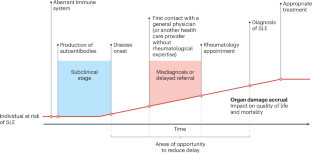Addressing the challenge of global delays in diagnosis and treatment of systemic lupus erythematosus
IF 32.7
1区 医学
Q1 RHEUMATOLOGY
引用次数: 0
Abstract
Systemic lupus erythematosus is a complex and increasingly prevalent disease that presents substantial challenges in both diagnosis and management. Diagnostic delays frequently lead to irreversible organ damage, and remain a crucial concern, mainly among vulnerable populations, such as minority ethnic groups and those living in the global south. These delays are exacerbated by the clinical heterogeneity of systemic lupus erythematosus, the lack of specific diagnostic biomarkers, gaps in disease awareness or medical training, and persistent health care disparities, particularly in low-resource settings. This Perspective highlights the urgent need for a standardized definition of diagnostic delay that accounts for both clinical and socio-economic factors. By prioritizing early intervention and expanding access to specialized care, we can improve patient outcomes and reduce the long-term burden of the disease. Delays in the diagnosis of systemic lupus erythematosus negatively affect the treatment, quality of life and outcomes of affected individuals. In this Perspective, the authors provide an overview of the contributing factors and consequences of diagnostic delay in systemic lupus erythematosus and discuss how this urgent issue should be addressed.


解决全球系统性红斑狼疮诊断和治疗延迟的挑战
系统性红斑狼疮是一种复杂且日益流行的疾病,在诊断和管理方面都提出了实质性的挑战。诊断延误往往导致不可逆转的器官损害,这仍然是一个关键问题,主要是在弱势人群中,如少数民族群体和生活在全球南方的人群中。系统性红斑狼疮的临床异质性、缺乏特定的诊断生物标志物、疾病意识或医疗培训的差距以及持续的医疗保健差距,特别是在资源匮乏的环境中,加剧了这些延误。这一观点强调了对诊断延误的标准化定义的迫切需要,该定义考虑了临床和社会经济因素。通过优先考虑早期干预和扩大获得专业护理的机会,我们可以改善患者的预后并减轻疾病的长期负担。
本文章由计算机程序翻译,如有差异,请以英文原文为准。
求助全文
约1分钟内获得全文
求助全文
来源期刊

Nature Reviews Rheumatology
医学-风湿病学
CiteScore
29.90
自引率
0.90%
发文量
137
审稿时长
6-12 weeks
期刊介绍:
Nature Reviews Rheumatology is part of the Nature Reviews portfolio of journals. The journal scope covers the entire spectrum of rheumatology research. We ensure that our articles are accessible to the widest possible audience.
 求助内容:
求助内容: 应助结果提醒方式:
应助结果提醒方式:


